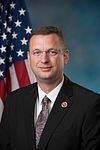| Revision as of 03:16, 16 September 2023 editCorgi Stays (talk | contribs)Extended confirmed users5,050 edits →List of members representing the district← Previous edit |
Revision as of 21:27, 28 September 2023 edit undoHangingCurve (talk | contribs)Autopatrolled, Extended confirmed users, Pending changes reviewers, Rollbackers101,052 edits fix ledeNext edit → |
| Line 25: |
Line 25: |
|
|cpvi = R+22<ref name=Cook>{{Cite web|title=2022 Cook PVI: District Map and List|url=https://www.cookpolitical.com/cook-pvi/2022-partisan-voting-index/district-map-and-list|access-date=2023-01-10|website=Cook Political Report|language=en}}</ref> |
|
|cpvi = R+22<ref name=Cook>{{Cite web|title=2022 Cook PVI: District Map and List|url=https://www.cookpolitical.com/cook-pvi/2022-partisan-voting-index/district-map-and-list|access-date=2023-01-10|website=Cook Political Report|language=en}}</ref> |
|
}} |
|
}} |
|
'''Georgia's 9th congressional district''' is a ] in the north of the ] of ]. The district is represented by ] ], who succeeded fellow Republican ].<ref>{{cite web |title=Republican Andrew Clyde wins election to U.S. House in Georgia's 9th Congressional District |url=https://thebrunswicknews.com/ap/national/republican-andrew-clyde-wins-election-to-u-s-house-in-georgias-9th-congressional-district/article_99d51f33-c07c-538a-904f-f7a9eb5df6a6.html |website=The Brunswick News}}</ref> The district is mostly rural and exurban in character, though it stretches into ] (home to ]) and some of ] on ]'s northern fringe. |
|
'''Georgia's 9th congressional district''' is a ] in the north of the ] of ]. The district is represented by ] ], who succeeded fellow Republican ].<ref>{{cite web |title=Republican Andrew Clyde wins election to U.S. House in Georgia's 9th Congressional District |url=https://thebrunswicknews.com/ap/national/republican-andrew-clyde-wins-election-to-u-s-house-in-georgias-9th-congressional-district/article_99d51f33-c07c-538a-904f-f7a9eb5df6a6.html |website=The Brunswick News}}</ref> The district is mostly rural and exurban in character, though it stretches into ] (home to the district's largest city, ]) and ] counties on ]'s northern fringe. |
|
|
|
|
|
The district has a heavy Republican lean. ] carried the district with almost 78 percent of the vote in 2016, his fourth-best showing in the nation. With a ] of R+30, it is the most Republican district in Georgia, the fourth-most Republican district in the nation, and the second-most Republican district in the ].<ref name=Cook/> Since then-congressman and future governor ] switched parties in 1995, no ] running in the district has crossed the 40 percent mark, and only one Democrat has won as much as 30 percent. |
|
The district has a heavy Republican lean. ] carried the district with almost 78 percent of the vote in 2016, his fourth-best showing in the nation. With a ] of R+30, it is the most Republican district in Georgia, the fourth-most Republican district in the nation, and the second-most Republican district in the ].<ref name=Cook/> Since then-congressman and future governor ] switched parties in 1995, no ] running in the district has crossed the 40 percent mark, and only one Democrat has won as much as 30 percent. |
|
|
|
|
|
Republicans are no less dominant at the state and local level. Even as the district turned increasingly Republican at the national level (] is the only Democratic presidential candidate to carry the district since 1960), conservative Democrats still held most local offices well into the 1990s. However, after Deal's party switch, Republicans gradually eroded the Democratic advantage, with the help of other party switchers. Today, there are almost no elected Democrats above the county level. Republicans typically win with margins of well over 70 percent of the vote on the occasions they face opposition at all. |
|
Republicans are no less dominant at the state and local level. It was one of the first areas of Georgia where old-line Southern Democrats began splitting their tickets. Despite this, even as the district turned increasingly Republican at the national level (] is the only Democratic presidential candidate to carry the district since 1960), conservative Democrats still held most local offices well into the 1990s. However, after Deal's party switch, Republicans gradually eroded the Democratic advantage, with the help of other party switchers. By the early 21st century, there were almost no elected Democrats left above the county level. Republicans typically win with margins of well over 70 percent of the vote on the occasions they face opposition at all. |
|
|
|
|
|
Much of this district was the ] from 2003 to 2007; it became the 9th once again in a mid-decade redistricting. |
|
Much of this district was the ] from 2003 to 2007; it became the 9th once again in a mid-decade redistricting. |
Republicans are no less dominant at the state and local level. It was one of the first areas of Georgia where old-line Southern Democrats began splitting their tickets. Despite this, even as the district turned increasingly Republican at the national level (Jimmy Carter is the only Democratic presidential candidate to carry the district since 1960), conservative Democrats still held most local offices well into the 1990s. However, after Deal's party switch, Republicans gradually eroded the Democratic advantage, with the help of other party switchers. By the early 21st century, there were almost no elected Democrats left above the county level. Republicans typically win with margins of well over 70 percent of the vote on the occasions they face opposition at all.
Nathan Deal resigned March 21, 2010 to run for Governor of Georgia. A special election was held on June 8, 2010.
Following redistricting, Tom Graves moved to the newly created 14th district.
 Interactive map of district boundaries since January 3, 2023
Interactive map of district boundaries since January 3, 2023
















